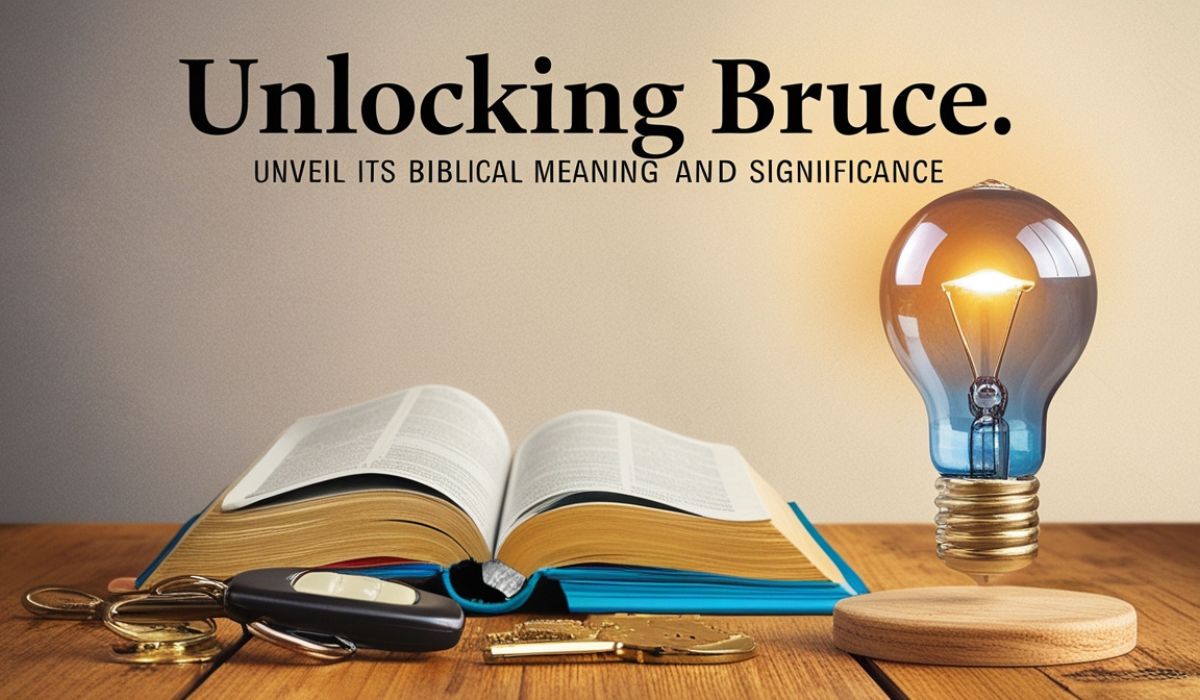The name Bruce carries with it a deep, historical resonance, both in the realms of history and culture.
While many recognize it as a Scottish surname, few realize its biblical significance and the symbolism it might hold.
The journey to understanding the true meaning of the name “Bruce” is not only a look into its etymology but also a deeper dive into its possible connections to biblical narratives, spiritual significance, and divine intervention.
In this article, we will explore the biblical meaning of the name Bruce, its spiritual significance, and how it ties into biblical themes of resilience, strength, and humility.
By examining both the historical and biblical contexts, we aim to unlock the name’s deeper meaning and explore why it still carries relevance today.
The Origin and Meaning of the Name Bruce

Bruce is a name that has evolved over centuries, with roots tracing back to the French and Scottish regions. Its earliest origins lie in the place-name “Brix,” a small town in Normandy, France.
The name itself translates to “from the brushwood thicket,” combining the Old French word brix (meaning brushwood) with the suffix -wood, denoting a place or an area of growth.
This description likely referred to a person living near or within a thicket or dense forest, suggesting both strength and resilience.
- Etymology of Bruce: Derived from the place-name Brix in Normandy, France.
- Meaning: “From the brushwood thicket” a natural setting tied to protection, growth, and resilience.
This place-name ties the identity of Bruce to nature, specifically brushwood thickets, which are dense, tough areas of growth.
In a spiritual sense, these thickets may symbolize protection, refuge, or even areas where one faces challenges that lead to growth.
Biblical Perspectives on Names
In the Bible, names are often more than just identifiers. They are identity markers, often representing divine revelation or spiritual calling.
God uses names in the Bible to convey messages of purpose, identity, and divine intervention.
From Abraham to Jacob, biblical names carry profound significance that informs the character and destiny of those who bear them.
- Names as Identity Markers: Throughout the Bible, names are not arbitrary but convey messages about one’s purpose or calling.
- Divine Revelation: Names often embody divine truth or a prophetic marker of what the individual will become.
Understanding this context, the name Bruce may hold hidden spiritual significance, especially when we consider its association with brushwood thickets, which were places of encounter with God, as we see in key biblical events.
The Biblical Meaning of Bruce: A Deeper Dive

While the name Bruce is not directly mentioned in the Bible, its biblical meaning can be drawn from the association with “brushwood thickets” in the natural world.
In biblical imagery, a thicket is a place that is not only difficult to navigate but also a site of divine intervention and revelation.
- Brushwood Thicket: Represents growth, protection, and strength in biblical narratives.
- Theological Symbolism: The brushwood thicket could symbolize a place of spiritual struggle that leads to growth, much like the struggles faced by biblical characters.
Biblical Imagery: The Symbolism of Brushwood and Thickets
Brushwood thickets appear in various forms in the Bible, often symbolizing both obstacles and divine grace.
The imagery of dense, tangled brushwood carries spiritual weight and can be seen as a metaphor for life’s difficulties but also for the strength and resilience that emerges from enduring them.
- Theological Symbolism: Brushwood thickets can symbolize resilience in the face of adversity, representing God’s protection or a refuge in the wilderness.
- Divine Intervention: The Bible often uses dense forests or thickets as settings where God intervenes in moments of great struggle or transformation.
Key Biblical Narratives Involving Brushwood and Thickets
Several pivotal biblical stories use brushwood or thickets as settings where key events unfold moments where divine intervention occurs and faith is tested.
Abraham and Isaac (Genesis 22:13)
In one of the Bible’s most powerful narratives, Abraham is tested by God to sacrifice his son Isaac. At the crucial moment, God provides a ram caught in a thicket to serve as a substitute for Isaac.
- Symbolism of the Thicket: The thicket represents God’s provision in moments of trial, a place where divine intervention occurs to save and provide a way out.
Moses and the Burning Bush (Exodus 3:2-5)
When Moses encounters the burning bush on Mount Horeb, it is in the midst of a desert wilderness.
While not explicitly a thicket, the setting evokes the imagery of a dense, difficult-to-navigate area where God reveals Himself to Moses.
- Divine Revelation: This moment in the Exodus narrative marks a pivotal point of calling and purpose, where God speaks to Moses, revealing the divine plan for the Israelites.
Thorn Symbolism in the Song of Solomon
In the Song of Solomon, thorns are referenced as a symbol of resilience in the face of challenges, and beauty emerging from difficult circumstances.
- Resilience in Suffering: The reference to thorns reminds us that growth and beauty often arise from suffering and challenges.
Humility and Strength in the Brushwood Thicket

In biblical terms, the brushwood thicket can be seen as a symbol of humility, strength, and resilience.
These qualities emerge as one faces the tangled brushwood, a place of spiritual struggle and transformation. Through these difficulties, individuals are tested, refined, and ultimately strengthened.
- Humility as a Christian Virtue: Just as Moses encountered God in the wilderness, so too do believers today find that spiritual growth often occurs in the most difficult of places.
- The Strength of Resilience: The brushwood thicket is not just a place of struggle but a refuge where one is protected and transformed by divine intervention.
Notable Bruces and Their Contributions to Christianity
The name Bruce has also been carried by many notable figures, both in history and in the Christian faith.
Robert the Bruce, for example, was a Scottish king whose life story is one of resilience, courage, and spiritual growth.
Additionally, Bruce Wilkinson, the author of The Prayer of Jabez, is a well-known figure in the Christian community, using his work to inspire many in their walk of faith.
- Robert the Bruce: A medieval king whose legacy in Christian leadership exemplifies the strength and courage associated with the name.
- Bruce Wilkinson: His theological contributions, particularly through The Prayer of Jabez, reflect the spiritual significance of the name Bruce.
These figures embody the strength and resilience that the name Bruce symbolizes in both the historical and spiritual contexts.
The Brushwood Thicket Warriors: The Influence of the Name Bruce

The legacy of the name Bruce is not just about its historical significance but also its spiritual meaning.
The name calls to mind individuals who have shown great resilience and leadership, often in the face of overwhelming adversity.
- Warriors of Faith: The name Bruce can be seen as a reminder of those who have stood firm in their faith, defending Christian principles with strength and humility.
- Leadership and Spiritual Strength: Whether in medieval battles or modern-day ministry, those who bear the name Bruce are often seen as leaders who model divine grace and spiritual strength.
Freqeuntly Asked Questions
Spiritual Meaning of the Name Bruce
The name Bruce symbolizes strength, resilience, and divine protection, reflecting biblical themes of overcoming adversity.
Bruce Name Meaning Bible
In the Bible, Bruce’s meaning connects to resilience and divine intervention, akin to themes found in biblical stories of faith and strength.
Meaning of the Name Bruce
The name Bruce originates from a French place-name meaning “from the brushwood thicket,” symbolizing survival and strength in adversity.
Meaning of Name Bruce
Bruce is derived from the Norman place-name Brix, which refers to a “brushwood thicket,” a symbol of resilience and endurance.
Bruce Name Meaning
Bruce’s meaning points to humble strength and resilience, encapsulated in the symbolism of brushwood thickets in nature.
Conclusion
The name Bruce holds rich biblical meaning, symbolizing not just a person or place but also a divine narrative of growth, strength, and resilience.
From its origins in the brushwood thicket to its connection to figures of spiritual leadership, the name Bruce embodies humility, protection, and divine intervention.
Understanding its biblical significance allows us to see how names, like Bruce, can carry profound spiritual weight, influencing both personal faith journeys and historical legacies.
In the end, just as the brushwood thicket represents both a place of challenge and refuge, the name Bruce reminds us of the divine protection and grace that lead us through life’s most difficult moments.
Whether in biblical stories or in the lives of great Christian figures, the name Bruce continues to carry divine meaning, offering a powerful testament to the enduring strength of faith.











